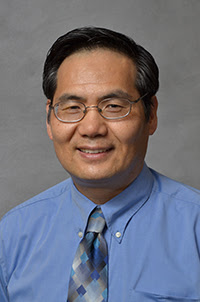Mutual Learning Marks Faqian Li's Outreach
April 2016

Faqian Li is an anatomic and clinical pathologist who studies head and neck, pulmonary, genitourinary, and cardiovascular diseases. He came to the University last year from the University of Rochester.
Dr. Li would like to interact with community pathologists who have unusual or uncommon cases of head and neck cancers such as salivary gland tumors as well as thoracic diseases such as pulmonary neuroendocrine tumors, interstitial lung disease, and thymic tumors.
"We'd like to share challenging clinical cases with other pathologists or they can share cases with us in a mutual learning way," Li said. "You may encounter only a few cases of extremely rare diseases in a lifetime as a pathologist. So unusual or uncommon cases have an important learning and teaching value." Li notes that the University's otolaryngology department has a large patient reference database and a large variety of specimens that can facilitate diagnosis and classification of head and neck diseases.
Li has developed new tools to facilitate clinical differential diagnosis of primary and metastatic lung tumors. Low-dose computed tomography (CT) screening of people with a history of heavy smoking now makes it possible to identify those at risk for developing lung cancer even before symptoms appear. Li said patients with evidence of tissue aberrations in whom malignancy cannot be conclusively ruled out by imaging are biopsied and standard cell morphology analysis is done in his laboratory. If the specimen is determined to be malignant, he sends it to UMMC's Molecular Diagnostic Laboratory for genetic mutational analysis, which can help guide treatment.
Dr. Li is active in basic as well as clinical translational research. His NIH-funded research is focused on the molecular mechanisms of congestive heart failure, a major health problem in developed countries with increasing incidence as the population ages. His laboratory hopes to shed light on how cardiac tissue regeneration can be achieved and full cardiac function restored in patients suffering from heart failure. Li is also conducting research in epigenetics, a new frontier in biology with far-reaching implications in aging, cancer, and many chronic diseases.